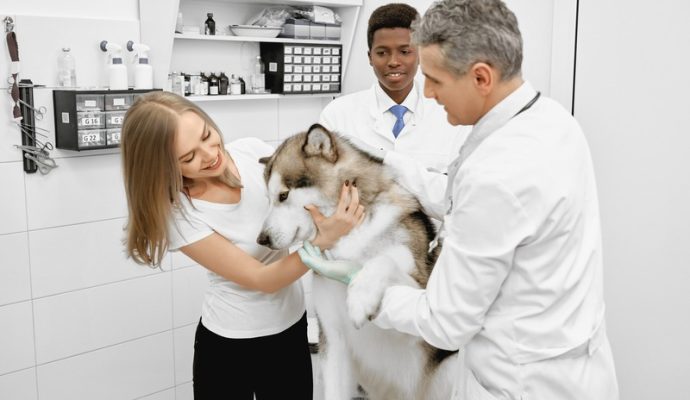Just like us, our pets get older and their health needs change. It’s important to know how to take care of our older pets, especially when it comes to keeping them safe from parasites. Even though parasites can affect pets of any age, our older pets may be more at risk. Today, let’s explore the critical topic of protecting our senior pets from parasites. We’ll learn why it’s crucial to prevent parasites in older pets, which parasites to be careful of, and when to start or keep up with prevention. Our goal is to ensure your beloved older pets are comfortable and safe as they age.
Parasite Risks in Aging Pets
First off, let’s talk about why geriatric pets need our attention when it comes to parasites. As pets age, their immune systems can weaken, making them less able to fend off infections and infestations. While it might seem logical to decrease prevention as your pet slows down and spends more time indoors, the risk of parasites likely remains the same – if not increases. Let’s not forget that parasites can be found everywhere, from the park to the backyard, and some, like fleas and ticks, can be brought into the home by other pets or humans.
Common Parasites in Geriatric Pets
So, what parasites should we look for as our pets enter their golden years? Here’s a quick list:
-
Fleas: These tiny insects can cause severe itching, allergies, and even anemia in severe infestations.
-
Ticks: Carriers of various diseases, ticks can be particularly harmful to older pets already dealing with age-related health issues.
-
Heartworms: Transmitted by mosquitoes, heartworm disease can lead to severe lung disease, heart failure, and other organ damage.
-
Intestinal parasites (worms): Roundworms, hookworms, whipworms, and tapeworms can cause symptoms from mild to severe.
When to Begin Parasite Prevention
Parasite prevention should be a lifelong initiative starting from puppyhood or kittenhood. However, it’s always possible to start if you’ve adopted an older pet or have yet to be consistent with prevention. Considering our pet’s history and lifestyle, we should be in close contact with our veterinarian to tailor a prevention program suitable for their senior years.
Choosing the Right Prevention Strategy
Consulting with Your Vet
When dealing with parasite prevention in older pets, working closely with your veterinarian is essential. Given their age and potentially compromised health, senior pets might need a different approach to prevention and treatment. Your geriatric veterinarian will consider factors like pre-existing conditions, current medications, and lifestyle before suggesting the most effective and safe prevention methods.
Safe Prevention Options
There are various options on the market for keeping parasites at bay. From topical treatments to oral medications, not all will suit every pet. Here’s what you may consider:
-
Topical treatments: These are applied to the skin and can protect against fleas, ticks, and other parasites.
-
Oral medications: Pills or chews that are given monthly to prevent heartworms and sometimes fleas and ticks.
-
Injectable medications: Some vets might suggest an injection that can provide long-term protection against parasites like heartworms.
-
Environmental controls: Keeping your home and yard free from parasites is also essential in prevention.
As always, be cautious with over-the-counter products and seek professional advice before using them. The wrong product or dosage could harm your aging pet more than good.
The Importance of Consistency and Monitoring
Sticking to a Schedule
With senior pets, consistency in prevention is critical. Many of us might get lax with treatments as our pets age, especially if they’re indoors more often. However, missing treatments can leave your pet unprotected and vulnerable to infestation or infection. Always keep a calendar or reminders to ensure you’re on track with your pet’s prevention schedule.
Regular Check-ups and Tests
Regular veterinary check-ups and diagnostic tests are crucial for senior pets. These visits are the perfect time to discuss parasite prevention. A West Chester vet in your local area can perform fecal tests to check for intestinal worms and blood tests for heartworms to confirm that your prevention strategy works effectively.
Signs of Parasite Infestation
Be vigilant and monitor your pet for any signs of parasites, which may include:
-
Excessive scratching or biting at their skin
-
Visible fleas or ticks on their coat
-
Changes in appetite or weight
-
Coughing, in the case of heartworms
-
Presence of worms in their stool
If you notice any unusual symptoms, it’s essential to contact your vet right away.
Combating Parasites While Caring for Your Geriatric Pet’s Overall Health
Integrating Prevention with General Care
Parasite prevention should go hand-in-hand with regular health management. This includes maintaining a healthy diet, ensuring appropriate exercise, and managing your pet’s chronic conditions. These factors contribute to a robust immune system that can better handle unwelcome parasites.
Considerations for Multi-pet Households
If you have younger pets along with your senior, it’s essential to manage parasite prevention for all of them. Parasites can quickly spread between animals, so protecting one pet means protecting all your pets.
When It’s Time to Adjust Prevention Methods
As pets age, their health changes may require different approaches to preventing parasites. You must update your vet on these changes to tailor the prevention plan. Your vet can also guide you on the timing of important cat and dog vaccinations. This is crucial for older pets, whose immune systems might weaken, making them more vulnerable to diseases. Always consult your vet for advice on parasite prevention and vaccinations to keep your aging pet healthy.
Final Thoughts
Senior pets need continuous parasite prevention, so working with your vet to adjust their care as they age is essential. Regular check-ups and a consistent parasite prevention schedule are key to their health. Watch for signs of parasites to keep your older pets comfortable. Giving them age-appropriate care is a great way to show love and respect for their loyalty.




